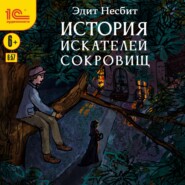По всем вопросам обращайтесь на: info@litportal.ru
(©) 2003-2024.
✖
Grim Tales
Настройки чтения
Размер шрифта
Высота строк
Поля
I determined to see Elvire, to know from her own lips whether by happy fortune this blow came, not from her, but from a woman in whom love might have killed honesty.
I walked from Hampstead to Gower Street. As I trod its long length, I saw a figure in pink come out of one of the houses. It was Elvire. She walked in front of me to the corner of Store Street. There she met Oscar Helmont. They turned and met me face to face, and I saw all I needed to see. They loved each other. Ida Helmont had spoken the truth. I bowed and passed on. Before six months were gone they were married, and before a year was over I had married Ida Helmont.
What did it I don't know. Whether it was remorse for having, even for half a day, dreamed that she could be so base as to forge a lie to gain a lover, or whether it was her beauty, or the sweet flattery of the preference of a woman who had half her acquaintances at her feet, I don't know; anyhow, my thoughts turned to her as to their natural home. My heart, too, took that road, and before very long I loved her as I had never loved Elvire. Let no one doubt that I loved her – as I shall never love again, please God!
There never was any one like her. She was brave and beautiful, witty and wise, and beyond all measure adorable. She was the only woman in the world. There was a frankness – a largeness of heart – about her that made all other women seem small and contemptible. She loved me and I worshipped her. I married her, I stayed with her for three golden weeks, and then I left her. Why?
Because she told me the truth. It was one night – late – we had sat all the evening in the verandah of our seaside lodging watching the moonlight on the water and listening to the soft sound of the sea on the sand. I have never been so happy; I never shall be happy any more, I hope.
"Heart's heart," she said, leaning her gold head against my shoulder, "how much do you love me?"
"How much?"
"Yes – how much? I want to know what place it is I hold in your heart. Am I more to you than any one else?"
"My love!"
"More than yourself?"
"More than my life!"
"I believe you," she said. Then she drew a long breath, and took my hands in hers. "It can make no difference. Nothing in heaven or earth can come between us now."
"Nothing," I said. "But, sweet, my wife, what is it?"
For she was deathly pale.
"I must tell you," she said; "I cannot hide anything now from you, because I am yours – body, soul, and spirit."
The phrase was an echo that stung me.
The moonlight shone on her gold hair, her warm, soft, gold hair, and on her pale face.
"Arthur," she said, "you remember my coming to you at Hampstead with that letter?"
"Yes, my sweet, and I remember how you – "
"Arthur!" – she spoke fast and low – "Arthur, that letter was a forgery. She never wrote it. I – "
She stopped, for I had risen and flung her hands from me, and stood looking at her. God help me! I thought it was anger at the lie I felt. I know now it was only wounded vanity that smarted in me. That I should have been tricked, that I should have been deceived, that I should have been led on to make a fool of myself! That I should have married the woman who had befooled me! At that moment she was no longer the wife I adored – she was only a woman who had forged a letter and tricked me into marrying her.
I spoke; I denounced her; I said I would never speak to her again. I felt it was rather creditable in me to be so angry. I said I would have no more to do with a liar and forger.
I don't know whether I expected her to creep to my knees and implore forgiveness. I think I had some vague idea that I could by-and-by consent with dignity to forgive and forget. I did not mean what I said. No, no; I did not mean a word of it. While I was saying it I was longing for her to weep and fall at my feet, that I might raise her and hold her in my arms again.
But she did not fall at my feet; she stood quietly looking at me.
"Arthur," she said, as I paused for breath, "let me explain – she – I – "
"There is nothing to explain," I said hotly, still with that foolish sense of there being something rather noble in my indignation, as one feels when one calls one's self a miserable sinner. "You are a liar and forger, and that is enough for me. I will never speak to you again. You have wrecked my life – "
"Do you mean that?" she said, interrupting me, and leaning forward to look at me. Tears lay on her cheeks, but she was not crying now.
I hesitated. I longed to take her in my arms and say – "Lay your head here, my darling, and cry here, and know how I love you."
But instead I kept silence.
"Do you mean it?" she persisted.
Then she put her hand on my arm. I longed to clasp it and draw her to me.
Instead, I shook it off, and said —
"Mean it? Yes – of course I mean it. Don't touch me, please! You have ruined my life."
She turned away without a word, went into our room, and shut the door.
I longed to follow her, to tell her that if there was anything to forgive I forgave it.
Instead, I went out on the beach, and walked away under the cliffs.
The moonlight and the solitude, however, presently brought me to a better mind. Whatever she had done had been done for love of me – I knew that. I would go home and tell her so – tell her that whatever she had done she was my dearest life, my heart's one treasure. True, my ideal of her was shattered, but, even as she was, what was the whole world of women compared to her? I hurried back, but in my resentment and evil temper I had walked far, and the way back was very long. I had been parted from her for three hours by the time I opened the door of the little house where we lodged. The house was dark and very still. I slipped off my shoes and crept up the narrow stairs, and opened the door of our room quite softly. Perhaps she would have cried herself to sleep, and I would lean over her and waken her with my kisses and beg her to forgive me. Yes, it had come to that now.
I went into the room – I went towards the bed. She was not there. She was not in the room, as one glance showed me. She was not in the house, as I knew in two minutes. When I had wasted a priceless hour in searching the town for her, I found a note on the dressing-table —
"Good-bye! Make the best of what is left of your life. I will spoil it no more."
She was gone, utterly gone. I rushed to town by the earliest morning train, only to find that her people knew nothing of her. Advertisement failed. Only a tramp said he had met a white lady on the cliff, and a fisherman brought me a handkerchief marked with her name that he had found on the beach.
I searched the country far and wide, but I had to go back to London at last, and the months went by. I won't say much about those months, because even the memory of that suffering turns me faint and sick at heart. The police and detectives and the Press failed me utterly. Her friends could not help me, and were, moreover, wildly indignant with me, especially her brother, now living very happily with my first love.
I don't know how I got through those long weeks and months. I tried to write; I tried to read; I tried to live the life of a reasonable human being. But it was impossible. I could not endure the companionship of my kind. Day and night I almost saw her face – almost heard her voice. I took long walks in the country, and her figure was always just round the next turn of the road – in the next glade of the wood. But I never quite saw her – never quite heard her. I believe I was not altogether sane at that time. At last, one morning as I was setting out for one of those long walks that had no goal but weariness, I met a telegraph boy, and took the red envelope from his hand.
On the pink paper inside was written —
"Come to me at once. I am dying. You must come. – Ida. – Apinshaw Farm, Mellor, Derbyshire."
There was a train at twelve to Marple, the nearest station. I took it. I tell you there are some things that cannot be written about. My life for those long months was one of them, that journey was another. What had her life been for those months? That question troubled me, as one is troubled in every nerve at the sight of a surgical operation or a wound inflicted on a being dear to one. But the overmastering sensation was joy – intense, unspeakable joy. She was alive! I should see her again. I took out the telegram and looked at it: "I am dying." I simply did not believe it. She could not die till she had seen me. And if she had lived all those months without me, she could live now, when I was with her again, when she knew of the hell I had endured apart from her, and the heaven of our meeting. She must live. I would not let her die.
There was a long drive over bleak hills. Dark, jolting, infinitely wearisome. At last we stopped before a long, low building, where one or two lights gleamed faintly. I sprang out.
The door opened. A blaze of light made me blink and draw back. A woman was standing in the doorway.
"Art thee Arthur Marsh?" she said.
"Yes."
"Then, th'art ower late. She's dead."

















